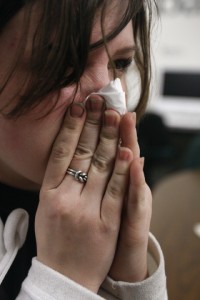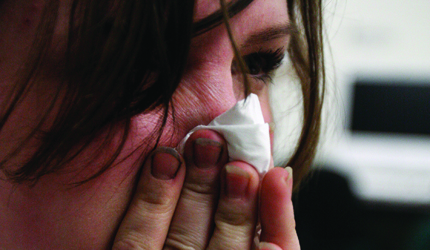
As cold air depletes moisture in the air, germs are more able to spread from person to person. Students are especially prone to sickness and should take extra precuations during the winter months.
By Molly Dunn
Reporter
It’s that time of year again. Temperatures change drastically, students are back in classes for the spring semester and just about everyone is coughing, sneezing or feeling ill.
Whether it is sitting in a classroom with coughing students, touching the door handle after someone who is sick or simply walking around campus in the cold weather, students are more prone to get sick during the winter than most other people.
“As the weather gets cold, it takes moisture out of the air and germs float more freely into the air,” Katherine Weaver, Providence Medical Center’s infection control nurse said.
This is why more people get sick or ill during the wintertime, especially college students.
Dr. Sharon W. Stern, Baylor’s medical director, also helped explain the increased illnesses in an e-mail to the Baylor Lariat.
“The fact that our students return after Christmas break from all corners of the globe, some of them bringing viruses with them, it is no surprise that there are many ill people during these months,” Stern said.
Stern and Weaver are encouraging students to take extra precautions during this time of the year due to the higher probability of catching a virus.
“Try not to touch your eyes, nose or mouth with your hands because that is how germs get transmitted into the body,” Weaver said.
“There are more problems with asthma when the weather gets cold and dry,” Stern said. “In addition, we here in Waco have mountain cedar pollen, which affects people with allergies. Mountain cedar pollen tends to peak from December to February.“
Stern also mentioned that there have not been any sudden illness outbreaks on campus yet, but Baylor Health Services is monitoring the activity of viruses on campus to keep students and faculty healthy.
“Students are at an increased risk because they may not eat healthy or get enough sleep and also are in closer contact with people,” Stern said.
Due to these circumstances, students are asked to follow the advice of Deloris Shaw, Infection Control Director for Hillcrest Baptist Medical Center. “If you are sick, be kind to other people and stay home,” Shaw said.
Shaw also explained the simple action of taking a step back when talking or standing next to another person could diminish the chance of spreading germs, since germs cannot be transmitted farther than 3 feet.
Shaw said other cold and germ preventions include a well-balanced diet as the immune system needs to be strengthened through multivitamins and various antibodies.
“The best way to avoid getting sick is to take care of yourself, eat right, get plenty of rest and wash your hands before eating or touching your face,” Stern said. “Fresh fruits and vegetables are helpful in keeping your immune system functioning well.”






